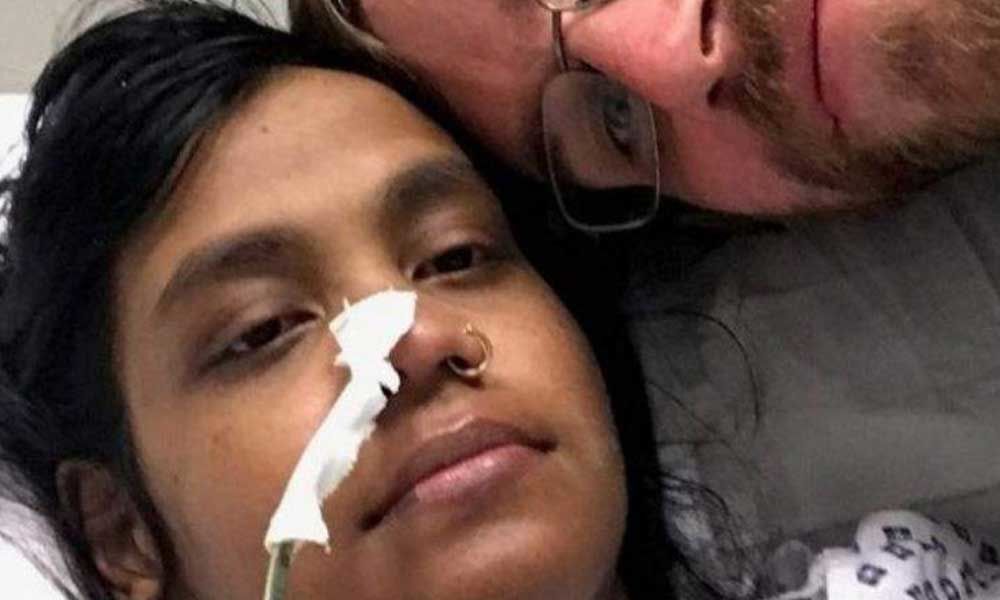Live
- Meet four trailblazing women striving tirelessly to protect the planet
- Konkona Sen Sharma goes international, to star opposite Javier Bardem’s brother Carlos in ‘Mis(s)chief’
- Prime Minister Narendra Modi to Visit Visakhapatnam on November 29
- People in my life inspire my fictional characters: Sugandha Pallan
- Japanese girl group, XG to make Coachella debut in April next year
- Are strict laws needed to ensure MLAs attend Assembly sessions?
- Do you support caste census? which one will you prefer caste census or skill census?
- Maha people gave big victory to Mahayuti led by BJP: Kishan
- Don’t rush to cover up harvested grain
- Ensure participation of all farmers in conference: CM
Just In

Bhavani Espathi, who came to Britain as a student, suffers from Crohn's Disease, a digestive tract disorder, for which she requires a specific immunosuppressant which is currently unavailable in India
LONDON: An Indian woman suffering from a rare disease, which left her in a coma after a major surgery, is fighting to stay in the UK and avoid being deported to India.
Bhavani Espathi, who came to Britain as a student, suffers from Crohn's Disease, a digestive tract disorder, for which she requires a specific immunosuppressant that she says is currently unavailable in India.
"The only thing keeping me somewhat 'healthy' besides constant medical attention are immunosuppressants such as Ustekinumab, which is currently unavailable in India, the country that the British Home Office believes is a place I should return for 'palliative care' instead of living in the UK," says the 31-year-old, who has launched an online campaign to seek support for her case.
The UK Home Office recently issued a letter stating that her application for leave to remain in the UK had been refused and that she was liable to be forcibly removed.
The letter arrived as she lay in a coma after a major operation and her fiance, Martin Mangler, appealed against the decision while she was still unconscious.
Medical letters from her doctors stated that her life would be at risk if she were to travel.
The Home Office's refusal letter to Espathi's appeal, issued in December last year, states: "Whereas it is accepted that the healthcare systems in the UK and in India are unlikely to be equivalent, this does not entitle you to remain here.
"Should it be the case that your illness deteriorates, or you are unable to access treatment, you have not shown a lack of palliative care or family support available in India.
"I thought there was no way they could dispute my application. I wasn't expecting them to say that even if the drugs aren't available then you could receive palliative care," she told The Independent newspaper.
"All of this is making my condition worse. You're meant to avoid stress, but I can't help my body's reaction to certain things. I'm currently in hospital and haven't been able to put on weight - stress is a big part of it," she said.
London-based Espathi had to be admitted to hospital again last month due to bowel-related complications.
She currently relies on a drip and has to have a bag attached to her stomach and is waiting to undergo further surgery in the coming months.
"This decision should be immediately reviewed and Ms Espathi should be allowed to stay in the country which has become her home, where she can get the medical care she desperately needs," said Chai Patel, legal director at the Joint Council for the Welfare of Immigrants (JCWI).
A UK Home Office spokesperson said: "In March 2019, the Home Office was made aware of fresh evidence in this case and this is currently being reviewed."
Canadian cryptocurrency president Gerald Cotten had died of Crohn's Disease in India
It must be recalled that earlier this year, a Canadian cryptocurrency exchange was granted bankruptcy protection after its president Gerald Cotten took passwords for accounts containing Can$180 million ($137 million US) to his grave when he died suddenly.
Cotten (30) had died of complications from Crohn's Disease on December 9, 2018 while volunteering at an orphanage in Jaipur, India.
Express had spoken to the Fortis Escorts Hospital in Jaipur where he was admitted. An official spokesperson had confirmed Cotten's death saying, "he was brought in an extremely critical condition."
It was also found that Cotten was on monoclonal antibody therapy ( targeted therapy used to treat colon cancer) every 8th week.

© 2024 Hyderabad Media House Limited/The Hans India. All rights reserved. Powered by hocalwire.com







